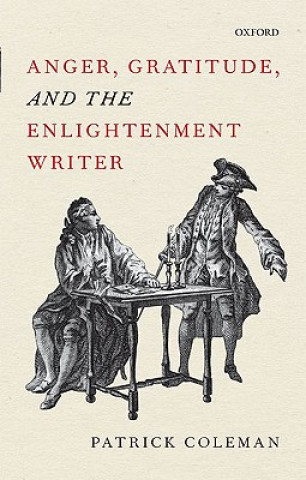
Kód: 04533640
Anger, Gratitude, and the Enlightenment Writer
Autor Patrick Coleman
Anger, Gratitude, and the Enlightenment Writer examines how writers as diverse as Rousseau, Diderot, Marivaux, and Challe discuss the social appropriateness of anger and gratitude in regulating social life. Emotions are social tr ... celý popis
- Jazyk:
 Angličtina
Angličtina - Vazba: Pevná
- Počet stran: 272
Nakladatelství: Oxford University Press, 2011
- Více informací o knize

4885 Kč
Dostupnost:
50 % šance Máme informaci, že by titul mohl být dostupný. Na základě vaší objednávky se ho pokusíme do 6 týdnů zajistit.
Máme informaci, že by titul mohl být dostupný. Na základě vaší objednávky se ho pokusíme do 6 týdnů zajistit.Prohledáme celý svět
Mohlo by se vám také líbit
-

Hot Pursuit: Troubleshooters 15
283 Kč -

Logic: Bullet Guides
238 Kč -

History of Armenia
4798 Kč -

Jack And Police Dog Rebel
312 Kč -

Daughters and Fathers
1066 Kč
Dárkový poukaz: Radost zaručena
- Darujte poukaz v libovolné hodnotě a my se postaráme o zbytek.
- Poukaz se vztahuje na celou naši nabídku.
- Elektronický poukaz vytisknete z e-mailu a můžete ihned darovat.
- Platnost poukazu je 12 měsíců od data vystavení.
Informovat o naskladnění knihy
Zadejte do formuláře e-mailovou adresu a jakmile knihu naskladníme, zašleme vám o tom zprávu. Pohlídáme vše za vás.
Více informací o knize Anger, Gratitude, and the Enlightenment Writer
Nákupem získáte 489 bodů
 Anotace knihy
Anotace knihy
Anger, Gratitude, and the Enlightenment Writer examines how writers as diverse as Rousseau, Diderot, Marivaux, and Challe discuss the social appropriateness of anger and gratitude in regulating social life. Emotions are social transactions, with rules identifying when and where it is appropriate to express one's feelings and, especially in the case of anger and gratitude, who is allowed or expected to put them on display. Defining the kinds of slight or favor that demand an angry or a grateful response became problematic in eighteenth-century France under the pressure of two contradictory developments which were both crucial to Enlightenment thinking about sociability. The first drew on the ideal of moral equality as it spread beyond the salons to the social world at large. Writers claimed for themselves an entitlement to anger at personal slight that had been hitherto reserved for aristocrats, and a respectful hearing for their indignation at public injustice despite their lack of official standing. The philosophes also argued their writing made them social benefactors in their own right, more deserving of their readers' gratitude than obliged to any patron. The second gave a new twist to longstanding philosophical notions about transcending emotional disturbance and dependence altogether. A personal ideal became a public goal as Enlightenment thinkers imagined a society where all significant social interaction was governed by the impersonal rule of law. Occasions for personal slight or obligation would disappear, and with them reasons for anger and gratitude. Instead of serving as a model of emotional legitimacy, authors would derive their prestige from their rationality and objectivity. By exploring the interplay between these two attitudes toward anger and gratitude this book provides a fresh perspective on the French Enlightenment.
 Parametry knihy
Parametry knihy
Zařazení knihy Knihy v angličtině Literature & literary studies Literature: history & criticism Literary studies: general
4885 Kč
- Plný název: Anger, Gratitude, and the Enlightenment Writer
- Autor: Patrick Coleman
- Jazyk:
 Angličtina
Angličtina - Vazba: Pevná
- Počet stran: 272
- EAN: 9780199589340
- ISBN: 0199589348
- ID: 04533640
- Nakladatelství: Oxford University Press
- Hmotnost: 462 g
- Rozměry: 223 × 149 × 20 mm
- Datum vydání: 06. January 2011
Oblíbené z jiného soudku
-

How to Read a Book
303 Kč -

Hamlet: The Oxford Shakespeare
268 Kč -

Art of Rhetoric
80 Kč -

Birth of Tragedy
250 Kč -

Selected Essays
276 Kč -

Complete Short Stories of Ambrose Bierce
518 Kč -

Serpent Power
523 Kč -

Moby-Dick
465 Kč -

Annotated Alice
323 Kč -

Nordic Noir
410 Kč -

Marquis de Sade: A Very Short Introduction
273 Kč -

Children's Fantasy Literature
670 Kč -

Mysteries of Udolpho
302 Kč -

Joseph Andrews and Shamela
227 Kč -

Mabinogion
276 Kč -

The Picture of Dorian Gray
170 Kč -
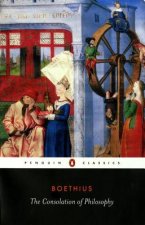
Consolation of Philosophy
276 Kč -

Seven Basic Plots
575 Kč -

Gulliver's Travels
170 Kč -

Life of Samuel Johnson
631 Kč -

Powers of Horror
1243 Kč -

Road to Hel
1373 Kč -

Sejong Korean Student Book 2A - English Edition, m. 1 Audio
733 Kč -

Anna Karenina
218 Kč -

Wide Sargasso Sea
236 Kč -

Edda
261 Kč -

Finn and Hengest
250 Kč -
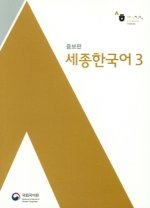
Sejong Korean 3, m. 1 Audio
681 Kč -

If Not, Winter: Fragments Of Sappho
464 Kč -

Africa's Tarnished Name
101 Kč -

Complete Poetry
196 Kč -

Captain is Out to Lunch
276 Kč -

Devils
268 Kč -

Two Treatises of Government
264 Kč -

Count of Monte Cristo
276 Kč -

Sejong Korean 2 (Korean+English Version), m. 1 Audio
681 Kč -

Moveable Feast
268 Kč -

Moveable Feast
290 Kč -

Reading Greek
964 Kč -

Dream Story
276 Kč -

Reading Greek
1021 Kč -

Analysis of Donna Haraway's A Cyborg Manifesto
243 Kč -

Poetics
276 Kč -

Selected Journals of Lm Montgomery Volume III 1921-1929
516 Kč -

Leaves of Grass
462 Kč -
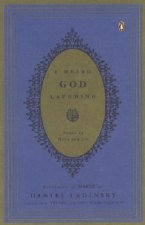
I Heard God Laughing
382 Kč -

Tragedy of King Richard III: The Oxford Shakespeare
223 Kč -
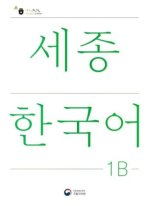
Sejong Korean Student Book 1B - Korean Version, m. 1 Audio
733 Kč -

Wild Ass's Skin
322 Kč
Osobní odběr Praha, Brno a 12903 dalších
Copyright ©2008-24 nejlevnejsi-knihy.cz Všechna práva vyhrazenaSoukromíCookies


 Vrácení do měsíce
Vrácení do měsíce 571 999 099 (8-15.30h)
571 999 099 (8-15.30h)